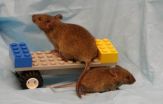(Press-News.org) Obesity caused by a high-fat diet may increase the risk of developing Parkinson's disease, new research in mice suggests. Upon aging, a high-fat diet significantly accelerated the onset of neurological symptoms in mice that were genetically predisposed to develop Parkinson's disease.
The Journal of Neurochemistry findings suggest that in addition to having negative effects on glucose and insulin regulation in the body, an unhealthy diet may also cause damage in the brain. More research is needed to uncover the molecular and cellular mechanisms involved.
INFORMATION:
Poor diet may increase risk of Parkinson's disease
2014-09-15
ELSE PRESS RELEASES FROM THIS DATE:
Tigers, pandas and people a recipe for conservation insight
2014-09-15
VIDEO:
Neil Carter and Vanessa Hull talk about what they've learned from the animals -- and people -- they study.
Click here for more information.
The first big revelation in conservation sciences was that studying the people on the scene as well as nature conservation was crucial. Now, as this science matures, researchers are showing that it's useful to compare apples and oranges.
Or, more accurately, tigers and pandas.
In this week's journal Ecology & Society, Michigan ...
Airborne particles beyond traffic fumes may affect asthma risk
2014-09-15
Researchers in Sydney and Newcastle, Australia have found that elements of dust, particularly those coarse particles that contain iron traces, stimulate the production of inflammatory molecules in cells from the airways of mice and healthy human volunteers. Surprisingly, traffic fume pollutants did not cause these changes. The findings are featured in a new Respirology study.
"These effects are likely to contribute to the development of asthma in childhood, as well as to worsening of asthma when pollution levels are high." said Dr. Rakesh Kumar, lead author of the study. ...
Cellular protein may be key to longevity
2014-09-15
Researchers have found that levels of a regulatory protein called ATF4, and the corresponding levels of the molecules whose expression it controls, are elevated in the livers of mice exposed to multiple interventions known increase longevity.
Elevation of ATF4, at least in the liver, seems to be a shared feature of diets, drugs, genes, and developmental alterations that extend maximum lifespan.
"Pathways that appear to change in the same way in many different kinds of slow-aging mice may provide helpful hints towards the design of drugs that keep people healthy longer ...
A thin line lies between fantasy and reality in people with psychopathic traits
2014-09-15
New research indicates that people with psychopathic traits have a preference for nonromantic sexual fantasies with anonymous and uncommitted partners. The study's investigators noted that psychopathic sexual behavior is likely due to a preference for sexual activity outside a loving, committed relationship rather than only an inability to form such relationships.
Individuals with deviant sexual preferences and normal levels of empathy, kindness, and self-control have many strategies for satisfying their needs, including negotiation, compromise, and restraint; however, ...
Run, cheetah, run
2014-09-15
CAMBRIDGE, MA -- Speed and agility are hallmarks of the cheetah: The big predator is the fastest land animal on Earth, able to accelerate to 60 mph in just a few seconds. As it ramps up to top speed, a cheetah pumps its legs in tandem, bounding until it reaches a full gallop.
Now MIT researchers have developed an algorithm for bounding that they've successfully implemented in a robotic cheetah — a sleek, four-legged assemblage of gears, batteries, and electric motors that weighs about as much as its feline counterpart. The team recently took the robot for a test run on ...
How a change in slope affects lava flows
2014-09-15
As soon as lava flows from a volcano, exposure to air and wind causes it to start to cool and harden. Rather than hardening evenly, the energy exchange tends to take place primarily at the surface. The cooling causes a crust to form on the outer edges of the lava flow, insulating the molten lava within. This hardened lava shell allows a lava flow to travel much further than it would otherwise, while cracks in the lava's crust can cause it to draw up short.
When there is a break in the terrain—a sharp change in slope, a valley, or a rock wall, for example—the smooth lava ...
Predicting prostate cancer: Pitt-developed test identifies new methods for treatment
2014-09-15
PITTSBURGH, Sept. 15, 2014 – A genetic discovery out of the University of Pittsburgh School of Medicine is leading to a highly accurate test for aggressive prostate cancer and identifies new avenues for treatment.
The analysis, published today in the American Journal of Pathology, found that prostate cancer patients who carry certain genetic mutations have a 91 percent chance of their cancer recurring. This research was funded by the National Institutes of Health (NIH), American Cancer Society and University of Pittsburgh Cancer Institute (UPCI).
"Being able to say, ...
Scientists identify the master regulator of cells' heat shock response
2014-09-15
Heat shock proteins protect the molecules in all human and animal cells with factors that regulate their production and work as thermostats. In new research published Sept. 16 in the journal eLife, scientists at NYU Langone Medical Center and elsewhere report for the first time that a protein called translation elongation factor eEF1A1 orchestrates the entire process of the heart shock response. By doing so, eEF1A1 supports overall protein homeostasis inside the cell, ensuring that it functions properly under various internal and external stress conditions. The researchers ...
Research offers new way to predict hurricane strength, destruction
2014-09-15
TALLAHASSEE, Fla. — A new study by Florida State University researchers demonstrates a different way of projecting a hurricane's strength and intensity that could give the public a better idea of a storm's potential for destruction.
Vasu Misra, associate professor of meteorology and co-director of the Florida Climate Institute, and fourth-year doctoral student Michael Kozar introduce in the Monthly Weather Review of the American Meteorological Society a new statistical model that complements hurricane forecasting by showing the size of storms, not just the wind speed.
The ...
This is your brain on snacks -- brain stimulation affects craving and consumption
2014-09-15
September 15, 2014 - Magnetic stimulation of a brain area involved in "executive function" affects cravings for and consumption of calorie-dense snack foods, reports a study in the September issue of Psychosomatic Medicine: Journal of Biobehavioral Medicine, the official journal of the American Psychosomatic Society. The journal is published by Lippincott Williams & Wilkins, a part of Wolters Kluwer Health.
After stimulation of the dorsolateral prefrontal cortex (DLPFC), young women experience increased cravings for high-calorie snacks—and eat more of those foods when ...




